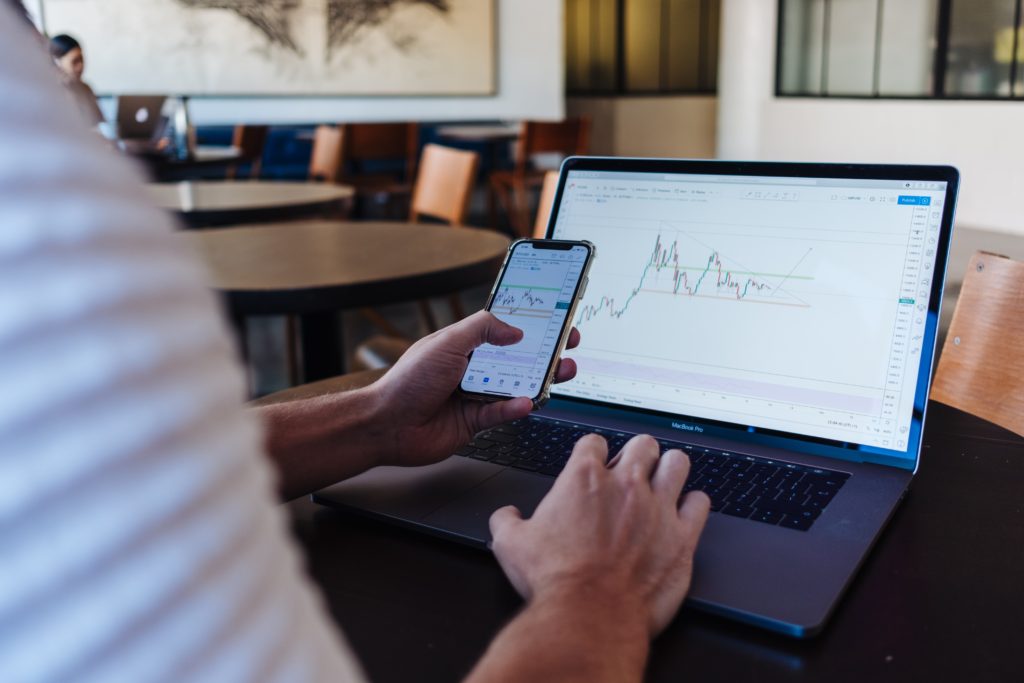Table of Contents
In the past month, the number of Covid-19 cases has really started to rise, especially in Europe & the US.
What followed, was the largest single-week decline in US stock markets since the last financial recession – 2008.
Fast forward to today and we’re in a market downturn with volatile stock prices, generally moving downwards.
And there are no signs that this market downturn is slowing…
Now in over 100 countries, the virus has spread to countries like South Korea, Japan, Iran, Italy, Singapore, and Malaysia.
As a result, companies are taking big hits in their supply chain, with companies like Apple, Microsoft, Samsung, & Tesla shutting down their factories in China.
What is now termed by the World Health Organization as a pandemic will take its toll on global economies, and resultantly, the stock markets.
Whilst there are numerous other more important consequences of the virus than the market downturn, we’ll be staying within our lane.
In this article, we’ll be sharing the role of Covid-19 in causing a market downturn, and what we should do in turbulent markets like these.
Next time this topic comes up within your circle of friends, you’d be able to chime in!
Whilst there are many losers in this market downturn, some companies actually benefit from the spread of the virus.
Direct Winners
1. Glove and mask manufacturers
This one’s quite straightforward. With the increased need for these items in response to the virus, stock prices are shooting up in anticipation of strong revenues and profit.
The stock is up over 25% since the turn of the year, going from RM4.25 to RM5.3.
As global demand surges, investors expect an increase in sales for Kossan’s rubber gloves. After all, Malaysia is the world’s fifth-largest rubber producer.
Indirect Winners
These are the companies that indirectly benefit from the growing temptation of consumers to stay home, stock up, and never leave their houses for the next 6 months.
For example, many large corporations (like Google, Facebook, Microsoft) are asking their employees to work from home as a precaution.
When this happens, bosses around the world scratch their heads thinking “If only there was a way I could get these guys to still be productive”.
Turns out, there is.
The growing need for work communication tools like Zoom & Slack means higher revenues in the upcoming quarters.
The main challenge for these companies is to make the effect lasting, rather than just being a one-off.
Personally, we think the valuations of these companies have already skyrocketed making them less attractive at current prices.
Funny story, some people mistakenly bought the wrong stock, Zoom Technologies, thinking it was Zoom Communications, sending the particular stock flying for no particular reason.
Of course, the price dropped back down as people realize their mistakes.
Direct Losers
When identifying who would suffer the most during this market downturn, think of the companies that are impacted by lower demands for travel, leisure activities, and basically – leaving their houses.
As if there was a reason to leave your house before…
Airlines are an obvious loser, especially those who have a significant portion of their revenue coming from international travel.
Just this week, the US imposed a ban of all travel to and from Europe, except the UK. Closer to home, Malaysia has also enforced travel bans to Italy, Iran, & South Korea.
In response to this, many companies in the industry have had to make tough decisions to make sure they’re able to weather this storm (no pun intended).
Malindo Air & AirAsia are cutting employee wages & benefits, while MAS has offered 3 months of unpaid leave.
On the other side of the globe, Europe’s largest regional airline Flybe has gone into administration, with Covid-19 proving to be the straw that broke the camels back.
Other than airlines – cruises, theme parks, & restaurants are feeling the full brunt of Covid-19.
The 2nd largest cruise company in the world, RCL is down to $33 from its highs of $133 barely a month ago.
The 75% drop means a $100 investment in this company would only leave you with $25 right now. All in the space of a few weeks.
Indirect Losers
Almost every other industry is struggling because of the pandemic.
The US DJI, a commonly cited index to measure the stock market health, is down 26% this year, while markets in the UK, Malaysia, Germany, and Hong Kong are down 26%, 11%, 26%,14% respectively.
Having said this, now seems to be the perfect time for those of you looking to start investing.
National Economic Council Director Larry Kudlow told CNBC: “To me, if you are an investor out there and you have a long-term point of view, I would suggest very seriously taking a look at a stock market that is a lot cheaper than it was a week or two ago.”
Wedbush’s Daniel Ives said in a note to clients “We view these times of fear and ‘white knuckle’ Street panic as witnessed over the past week with the coronavirus outbreak as while tragic for the individuals and families impacted, representing golden buying opportunities to own the tech themes and stocks that we believe will be long term winners,”.
The good thing about hitting rock bottom – the only way is up.
However, it’s impossible to tell where the turning point is. No one knows.
What to do in a market downturn
Bear markets are defined by drops of 20% or more from recent highs.
On the 11th of March, the Dow Jones officially entered a bear market. Statistically, bear markets happen every 3.5 years on average.
The one we’re in right now is the first we’ve had in 11 years, over 3x the mean.
1. Keep calm. If you’re invested for the long-term, don’t sell.
If you’re like us and have some investments already in the market, now’s not the time to panic, especially if you’re in it for the long haul.
While we may not know what’s going to happen in the short & medium terms, the long term view is pretty straight cut – markets always recover from a downturn.
Think of it as if you’re scaling a mountain.
As you go up, there’s always the need to take a break, which will fuel you to greater highs than you were at before.
Yes, there will be times of volatility that would make your stomach churn but remember that we’re in a marathon, not a sprint.
Selling your long term investments now means you’re locking in your losses and won’t be there to enjoy the impending rebound.
Of course, you could sell it all now and buy it back at a better price, but do you really know when the best time to buy is?
Personal losses
For many of us including myself, this is probably the first time we’ve been through a market downturn like this.
This is a view of one of our StashAway portfolios (36%).
The recent downturn has caused it to go red for the first time, with a money-weighted return of -34%.
Being StashAway’s highest risk portfolio, a decline like this is inevitable.
Thankfully, our investment at this risk level is only RM585.
Still, my gameplan remains the same.
Our weekly auto-debit will go on, and we have no plans to withdraw this money or move it somewhere else.
Think about it this way, stocks are cheaper now.
A month ago, one share of Apple would cost you $320. Buy it now, and it’ll only set you back $248, a 23% discount!
It’s still the same company, isn’t it?
An eye-opening stat would really make you think twice about caving into the panic
. Morningstar, an investing data firm, analyzed 20 years of market activity leading up to 2017 – and found that someone who kept their investments through this period would have an annualized return of 7.2%.
An investor who missed out on only the 10 best days in this entire 20 year period? His returns would drop by more than half at just 3.5%.
This serves as a reminder that time in the market > timing the market.
Baron Rothschild once said: “buy when there’s blood in the street, even if the blood is your own.”
2. If you’re not in, it’s the perfect time to start
For those of you who have been hesitant in entering the stock market, there’s no better time to start than now.
The stock market downturn caused a more than 25% decline in 2020, meaning financially strong companies with good fundamentals can be bought at a discount.
Personally, we don’t think the market has reached a bottom and prices could still fall.
This doesn’t mean you should be waiting for it before buying, especially if you’re new and have little to no knowledge of the financial markets.
Anyone who says they know when the bottom is – ignore them.
A good piece of advice a friend gave was to split your capital into 5 buckets and invest it in batches.
Say you have RM5,000 sitting there, split them into five RM1,000 deposits and invest it monthly over the next 5 months.
This ensures you average out your positions and not catch a falling knife with your entire portfolio.
3. Cut back on spending. Save as much as you can to invest
In our previous article, we mention that it’s not my style to cut down costs to a bare minimum just so we can retire by 40.
We’re gonna put the statement on hold because if there was a time to do this, now’s it.
Other than cutting down on costs, it’s also a good time to look at ways to grow your income.
This market downturn brings 2 good reasons why we should do these:
a) Ensuring your rainy day fund
Having your emergency savings is key, and it’s for times like these.
If you get infected by the virus (touch wood), your emergency fund will help foot any treatment fees or loss of income.
Before even thinking about investments, we recommend having 3-6 months’ worth of expenses in a low risk, highly liquid product.
The last thing you want to do is be forced to sell your investments, locking in a loss.
Once you’ve got this sorted, we get to the fun part!
b) It’s an amazing opportunity to buy
We’re not advocating buying stocks just because they’re cheap. That’s speculation.
What we’re looking for are companies with strong fundamentals that are selling off only due to the panic.
Examples of this are Microsoft, Apple, & Google.
These stocks are all down more than 20% from recent all-time highs, yet have no drastic change in the way they do work and solve problems for billions across the globe.
Other than this, we’re also looking at stocks who have been beaten down badly by the virus, as mentioned in my “Direct Losers” part of this article.
For example, Delta Airlines is down around 50% from it’s high in January.
This decline is on the basis that the virus will reduce demand for air travel, which is true.
Will the drop last though?
Once the pandemic starts to fade away, air travel will continue on as usual, whether if it’s for a holiday or a crucial business conference.
There definitely are risks that the company never gets to see the light at the end of the tunnel, which is why it’s important to identify those with large cash positions and low short-term debts.
These stocks tend to go up the quickest after a recession, as people start to book their travels after long periods of social isolation.
I don’t know about you, but we’re gonna start planning my next holiday as soon as the virus starts to tone down!

There are 2 camps recently on social media, with Tesla CEO Elon Musk advocating for stocks that benefit from this, being Zoom & Slack.
On the other side of the ring, legendary fundamental investor Warren Buffet puts his money on stocks that took a beating, like Delta Airlines and Royal Caribbean Cruise.
Which side are you on?
Bottom line
The market has been battered this year due to the widespread of Covid-19.
The million-dollar question is, will it be shortlived and recover quickly after containment or will it be a catalyst to a market recession that would mark a longer horizon of economic depression?
Who knows.
Since we’re not professional traders or politicians, let’s leave it to them to work this one out.
Personally, we’re gonna continue with our long-term investment plan and cut down on my costs so we have more to go bargain hunting in this market downturn.
For the next few months, shopping will look a lot less like this:

And a lot more like this:

If you enjoyed reading this article, share the love with your friends and family!
We even have shiny social buttons so you can post it directly to your social media. We’d really appreciate it!
Check out these related articles:
- How Much Money Do You Need To retire?
- Active vs Passive Investing – Which Is For You?
- Investing – The Money Move Most Women Don’t Make


1 thought on “Covid-19 & What To Do In A Market Downturn”